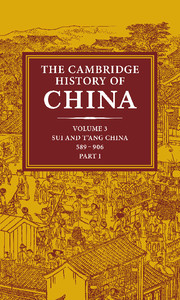Book contents
- Frontmatter
- 1 Introduction
- 2 The Sui dynasty (581–617)
- 3 The founding of the T'ang dynasty: Kao-tsu (reign 618–26)
- 4 T'ai-tsung (reign 626–49) the consolidator
- 5 Kao-tsung (reign 649–83) and the empress Wu: the inheritor and the usurper
- 6 The reigns of the empress Wu, Chung-tsung and Jui-tsung (684–712)
- 7 Hsüan-tsung (reign 712–56)
- 8 Court and province in mid- and late T'ang
- 9 Court politics in late T'ang times
- 10 The end of the T'ang
- Glossary Index
- References
4 - T'ai-tsung (reign 626–49) the consolidator
Published online by Cambridge University Press: 28 March 2008
- Frontmatter
- 1 Introduction
- 2 The Sui dynasty (581–617)
- 3 The founding of the T'ang dynasty: Kao-tsu (reign 618–26)
- 4 T'ai-tsung (reign 626–49) the consolidator
- 5 Kao-tsung (reign 649–83) and the empress Wu: the inheritor and the usurper
- 6 The reigns of the empress Wu, Chung-tsung and Jui-tsung (684–712)
- 7 Hsüan-tsung (reign 712–56)
- 8 Court and province in mid- and late T'ang
- 9 Court politics in late T'ang times
- 10 The end of the T'ang
- Glossary Index
- References
Summary
The future T'ai-tsung, Li Shih-min, the second son of Kao-tsu, was born in the year 600 in Wu-kung county in modern Shensi. His mother was a member of an extremely powerful clan, the Tou. Her elder sister was the consort of Yang Kuang, the future Sui emperor Yang-ti. Their clan, which like the Sui and T'ang imperial houses was of partially alien origin (their original surname was Ho-tou-ling), continued to be very influential throughout the early T'ang, producing two empresses, six consorts of royal princes, eight husbands of royal princesses, and a great number of officials of the highest ranks. T'ai-tsung's mother had been brought up at the court of her uncle, the emperor Wu-ti of the Northern Chou (whose younger sister was her mother), where Li Yüan is said to have won her hand in an archery contest. She died in 614.
During his childhood Li Shih-min was, of course, simply a son of a nobleman, and thus would not have received any special preparation as a potential ruler. He certainly received the upper-class Confucian education typical of the time: later, as emperor he proved to be well versed in classical and historical learning and was a calligrapher of note. The Li clan, bearer of a strong northern tradition, was naturally Buddhist, and several of Kao-tsu's sons bore Buddhist childhood names. But, as with most noblemen of mixed Chinese and Turkish blood, the emphasis of T'ai-tsung's early education was upon the martial arts – particularly archery and horsemanship.
- Type
- Chapter
- Information
- The Cambridge History of China , pp. 188 - 241Publisher: Cambridge University PressPrint publication year: 1979
References
- 7
- Cited by

